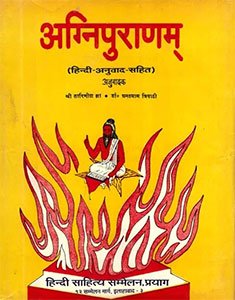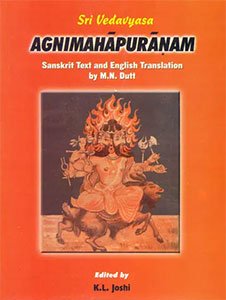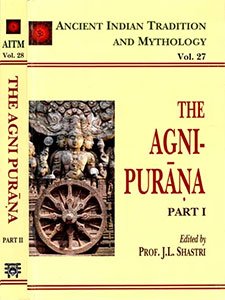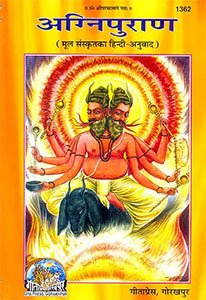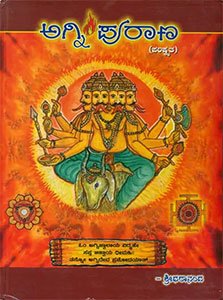Agni Purana [sanskrit]
97,288 words
This Sanskrit edition of the Agnipurana. It is one of the traditional eighteen Mahapuranas presented as an encyclopedia of ancient Indian history and knowledge. It contains either 382 or 383 chapters and over 10.000 verses (Sanskrit Shlokas).
Verse 306.17
द्वर्वाभिरायुषे पद्मौः श्रिये पुत्रा उडुम्बरैः ।
गोसिद् ध्यै सर्पिंषा गोष्ठे मेधायै सर्वशाखिना ॥ १७ ॥
dvarvābhirāyuṣe padmauḥ śriye putrā uḍumbaraiḥ |
gosid dhyai sarpiṃṣā goṣṭhe medhāyai sarvaśākhinā || 17 ||
The Sanskrit text of Verse 306.17 is contained in the book The Agni Puranam (Anandashram Edition) by Shri Chimna Apate (श्री चिमणा आपटे). This book is available online or you could buy the latest edition:
Read online Buy now! The Sanskrit text by Shri Chimna Apate (श्री चिमणा आपटे) (1987)
Glossary of Sanskrit terms
Note: This extracts Sanskrit terms and links to English definitions from the glossary, based on an experimental segmentation of verse (306.17). Some terms could be superfluous while some might not be mentioned. Click on the word to show English definitions.
Dva, Arva, Ayusha, Ayus, Padma, Shri, Shriya, Putra, Udumbara, Sarpi, Sha, Goshtha, Medha, Sarva, Shakhi, Shakhin,
Analysis of Sanskrit grammar
Note: this is an experimental feature and only shows the first possible analysis of the Sanskrit text (Verse 306.17). If the system was successful in segmenting the sentence, you will see of which words it is made up of, generally consisting of Nouns, Pronouns, Verbs, Participles and Indeclinables. Click on the link to show all possible derivations of the word.
- Line 1: “dvarvābhirāyuṣe padmauḥ śriye putrā uḍumbaraiḥ ”
- dva -
-
dū (noun, feminine)[compound], [adverb], [vocative single]dva (noun, masculine)[compound], [vocative single]dva (noun, neuter)[compound], [vocative single]
- arvābhir -
-
arvā (noun, feminine)[instrumental plural]
- āyuṣe -
-
āyuṣa (noun, neuter)[nominative dual], [vocative dual], [accusative dual], [locative single]āyus (noun, masculine)[dative single]āyus (noun, neuter)[dative single]
- padmau -
-
padma (noun, masculine)[compound], [nominative dual], [vocative single], [vocative dual], [accusative dual]padma (noun, neuter)[compound], [vocative single]padmā (noun, feminine)[nominative single]
- auḥ -
-
o (noun, masculine)[nominative single], [vocative single]au (noun, feminine)[nominative single], [vocative single]au (noun, masculine)[nominative single], [vocative single]√u (verb class 2)[imperfect active second single]
- śriye -
-
śrī (noun, feminine)[dative single]śrī (noun, masculine)[dative single]śriyā (noun, feminine)[nominative dual], [vocative single], [vocative dual], [accusative dual]śriya (noun, masculine)[locative single]śriya (noun, neuter)[nominative dual], [vocative dual], [accusative dual], [locative single]
- putrā* -
-
putra (noun, masculine)[nominative plural], [vocative plural]putrā (noun, feminine)[nominative plural], [vocative plural], [accusative plural]
- uḍumbaraiḥ -
-
uḍumbara (noun, masculine)[instrumental plural]uḍumbara (noun, neuter)[instrumental plural]
- Line 2: “gosid dhyai sarpiṃṣā goṣṭhe medhāyai sarvaśākhinā ”
- Cannot analyse gosid*dh
- dhyai -
-
- sarpiṃ -
-
sarpi (noun, masculine)[accusative single]
- ṣā* -
-
ṣa (noun, masculine)[nominative plural], [vocative plural]ṣā (noun, feminine)[nominative plural], [vocative plural], [accusative plural]
- goṣṭhe -
-
goṣṭha (noun, masculine)[locative single]goṣṭha (noun, neuter)[nominative dual], [vocative dual], [accusative dual], [locative single]goṣṭhā (noun, feminine)[nominative dual], [vocative single], [vocative dual], [accusative dual]
- medhāyai -
-
medhā (noun, feminine)[dative single]
- sarva -
-
sarva (noun, neuter)[compound], [vocative single]sarva (noun, masculine)[vocative single]
- śākhinā -
-
śākhi (noun, masculine)[instrumental single]śākhin (noun, masculine)[instrumental single]śākhin (noun, neuter)[instrumental single]
Other editions:
Also see the following editions of the Sanskrit text or (alternative) English translations of the Verse 306.17
Agni Purana with Hindi Translation
by Tarinish Jha and Dr. Ghanshayam Tripathi (तारिणीश् झा और डॉ. घनश्याम त्रिपाठी) (2007)
Publisher: Hindi Sahitya Sammelan, Allahabad; 1199 pages; Title: अग्निपुराणम् (संस्कृत एवं हिन्दी अनुवाद);
Buy now!
Agni Purana (Two Volumes)
by M. N. Dutt (2023)
Publisher: Parimal Publication Pvt. Ltd.; Editor: K. L. Joshi.; ISBN-10: 8171101690; ISBN-13: 9788171101696; 1070 pages.
Buy now!
Agni-Purana (Set of 4 Volumes)
by N. Gangadharan (2006)
Publisher: Motilal Banarsidass Publishers Pvt. Ltd.; ISBN: Part I 8120803590 (9788120803596); Part II 8120803604 (9788120803602); Part III 8120801741 (9788120801745); Part IV 812080306X (9788120803060); 1271 pages.
Buy now!
The Agni Purana (Hindi)
by (2013)
Publisher: Gita Press, Gorakhpur; Title: अग्निपुराण (केवल हिन्दी अनुवाद); ISBN-10: 8129302934; ISBN-13: 9788129302939; 848 pages.
Buy now!
Agni Purana (Kannada)
by Sreedharananda (2013)
Publisher: Pooja Pusthaka Bhandara, Bangalore; Title: ಅಗ್ನಿ ಪುರಾಣ; 560 pages.
Buy now!Preview of verse 306.17 in Kannada sript:
ದ್ವರ್ವಾಭಿರಾಯುಷೇ ಪದ್ಮೌಃ ಶ್ರಿಯೇ ಪುತ್ರಾ ಉಡುಮ್ಬರೈಃ ।
ಗೋಸಿದ್ ಧ್ಯೈ ಸರ್ಪಿಂಷಾ ಗೋಷ್ಠೇ ಮೇಧಾಯೈ ಸರ್ವಶಾಖಿನಾ ॥ ೧೭ ॥
![Agni Purana [sanskrit] - book cover](/uploads/a/Agni-Purana-Sanskrit.jpg)
